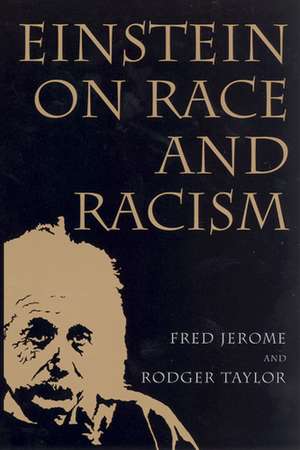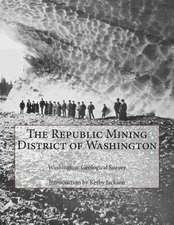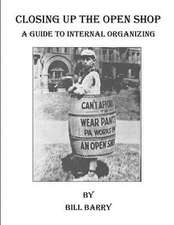Einstein on Race and Racism: Einstein on Race and Racism, First Paperback Edition
Autor Professor Fred Jerome, Rodger Tayloren Limba Engleză Paperback – 25 iul 2006
Honorable Mention in the 2005 Gustavus Myers Outstanding Book Awards
Nearly fifty years after his death, Albert Einstein remains one of America's foremost cultural icons. A thicket of materials, ranging from scholarly to popular, have been written, compiled, produced, and published about his life and his teachings. Among the ocean of Einsteinia-scientific monographs, biographies, anthologies, bibliographies, calendars, postcards, posters, and Hollywood films-however, there is a peculiar void when it comes to the connection that the brilliant scientist had with the African American community. Nowhere is there any mention of his close relationship with Paul Robeson, despite Einstein's close friendship with him, or W.E.B. Du Bois, despite Einstein's support for him.
This unique volume is the first to bring together a wealth of writings by the scientist on the topic of race. Although his activism in this area is less well known than his efforts on behalf of international peace and scientific cooperation, Einstein spoke out vigorously against racism both in the United States and around the world. Fred Jerome and Rodger Taylor suggest that one explanation for this historical amnesia is that Einstein's biographers avoided "controversial" topics, such as his friendships with African Americans and his political activities, including his involvement as co-chair of an antilynching campaign, fearing that mention of these details may tarnish the feel-good impression his image lends topics of science, history, and America.
Combining the scientist's letters, speeches, and articles with engaging narrative and historical discussions that place his public statements in the context of his life and times, this important collection not only brings attention to Einstein's antiracist public activities, but also provides insight into the complexities of antiracist culture in America. The volume also features a selection of candid interviews with African Americans who knew Einstein as children.
For a man whose words and reflections have influenced so many, it is long overdue that Einstein's thoughts on this vital topic are made easily accessible to the general public.
Nearly fifty years after his death, Albert Einstein remains one of America's foremost cultural icons. A thicket of materials, ranging from scholarly to popular, have been written, compiled, produced, and published about his life and his teachings. Among the ocean of Einsteinia-scientific monographs, biographies, anthologies, bibliographies, calendars, postcards, posters, and Hollywood films-however, there is a peculiar void when it comes to the connection that the brilliant scientist had with the African American community. Nowhere is there any mention of his close relationship with Paul Robeson, despite Einstein's close friendship with him, or W.E.B. Du Bois, despite Einstein's support for him.
This unique volume is the first to bring together a wealth of writings by the scientist on the topic of race. Although his activism in this area is less well known than his efforts on behalf of international peace and scientific cooperation, Einstein spoke out vigorously against racism both in the United States and around the world. Fred Jerome and Rodger Taylor suggest that one explanation for this historical amnesia is that Einstein's biographers avoided "controversial" topics, such as his friendships with African Americans and his political activities, including his involvement as co-chair of an antilynching campaign, fearing that mention of these details may tarnish the feel-good impression his image lends topics of science, history, and America.
Combining the scientist's letters, speeches, and articles with engaging narrative and historical discussions that place his public statements in the context of his life and times, this important collection not only brings attention to Einstein's antiracist public activities, but also provides insight into the complexities of antiracist culture in America. The volume also features a selection of candid interviews with African Americans who knew Einstein as children.
For a man whose words and reflections have influenced so many, it is long overdue that Einstein's thoughts on this vital topic are made easily accessible to the general public.
Preț: 185.63 lei
Nou
Puncte Express: 278
Preț estimativ în valută:
35.52€ • 38.57$ • 29.84£
35.52€ • 38.57$ • 29.84£
Carte disponibilă
Livrare economică 02-16 aprilie
Preluare comenzi: 021 569.72.76
Specificații
ISBN-13: 9780813539522
ISBN-10: 0813539528
Pagini: 224
Ilustrații: 26
Dimensiuni: 140 x 216 x 18 mm
Greutate: 0.27 kg
Ediția:None
Editura: Rutgers University Press
Colecția Rutgers University Press
ISBN-10: 0813539528
Pagini: 224
Ilustrații: 26
Dimensiuni: 140 x 216 x 18 mm
Greutate: 0.27 kg
Ediția:None
Editura: Rutgers University Press
Colecția Rutgers University Press
Notă biografică
FRED JEROME is the author of The Einstein File: J. Edgar Hoover's Secret War against the World's Most Famous Scientist . A veteran journalist and science writer, his articles and op-ed pieces have appeared in dozens of publications, including Newsweek, Technology Review, and The New York Times. He has taught journalism at Columbia Journalism School, New York University, and numerous other New York-area universities.
RODGER TAYLOR, a supervising branch librarian with the New York Public Library, is also a freelance writer. His articles on city life, early African American New York, and the African Burial Ground have been published in local newspapers and magazines, including several in New York Newsday.
RODGER TAYLOR, a supervising branch librarian with the New York Public Library, is also a freelance writer. His articles on city life, early African American New York, and the African Burial Ground have been published in local newspapers and magazines, including several in New York Newsday.
Recenzii
"While Albert Einstein is most famous for his theory of relativity, he held fervently to some moral absolutes, few more precious than his heroic and passionate anti-racist writing and activism. Einstein on Race and Racism brilliantly recovers the engaging, principled, and courageous views of one of history's most famous scientists, whose anti-racist writings have been ignored, overlooked, even hidden from the world by his biographers and custodians. Thanks to Fred Jerome and Rodger Taylor, we have unimpeachable evidence that the 'Man of the Century' wrestled fearlessly and insightfully with what his friend W.E.B. Du Bois termed the century's greatest problem: the color line. This is one of the year's most important books."
"This book continues the process of peeling back the politics of Albert Einstein to reveal a vital (and up to now invisible) layer of anti-racism activities. It demonstrates, through Einstein's example, how not to 'stand idly by' in the face of America's most pernicious problem-racism.
"
"
"Fred Jerome and Rodger Taylor paint a compelling portrait of an Einstein who has been almost completely absent from the public record: the man who co-chaired a committee that pushed for federal anti-lynching legislation, who joined the campaign to save the 'Scottsboro boys,' who helped sponsor the NAACP's Legal Defense Fund, who became a close friend and supporter of Paul Robeson, who frequently strolled through Princeton's African-American neighborhoods-in short, a man not afraid to use his fame to battle the racism that plagued America (and Princeton, both town and university) during his years in the U.S. This is a side-an important side-of the great physicist and pacifist that anyone interested in the man, and his times, will find eye-opening.
"
"
"In Einstein on Race and Racism, the authors remind us that it is significant to achieve consciousness through education. Through their historical analysis, they unveil the interconnection that existed between Paul Robeson and Einstein, so as to ensure that contemporary scholars understand humanizing pedagogy and civic responsibilities. This is insightful scholarship that explores race and racism, drawing on the analytical insights of innovative giants of divergent social and professional recognition.
"
"
"For many people around the world, Einstein's name is a household word, and yet Fred Jerome and Rodger Taylor's important new book reveals in startling ways how little we know about his profound insights into the realities of race and racism. Who knew? Fortunately for all of us, Einstein's ideas and insights on this issue are as timely and instructive as his most advanced scientific contributions. We owe Fred and Rodger a huge debt of gratitude.
"
"
"As any reader of Faulkner knows, Princeton University before the Second World War was a southern university, and the town of Princeton adopted corresponding racial attitudes. In 1933 into this community came Albert Einstein, fresh from cosmopolitan Weimar Berlin and with the example of how Nazi anti-Semitism was helping to destroy all that was best in German culture. This book tells the story of how he reacted to the racism he saw around him, and to the fight-back against it by Princeton's long-established black community. It is a fascinating story and, unfortunately for our country, it is not just history but a contribution to contemporary struggles against American racism, at home and abroad.
"
"
Descriere
Combining Albert Einstein's letters, speeches, and articles with engaging narrative and historical discussions that place his public statements in the context of his life and times, this important collection not only brings attention to Einstein's antiracist public activities, but also provides insight into the complexities of antiracist culture in America. The volume also features a selection of candid interviews with African Americans who knew Einstein as children. For a man whose words and reflections have influenced so many, it is long overdue that Einstein's thoughts on this vital topic are made easily accessible to the general public.










